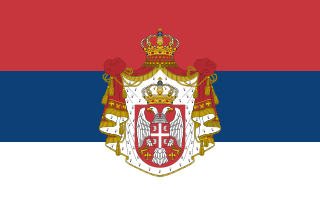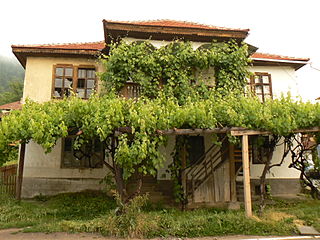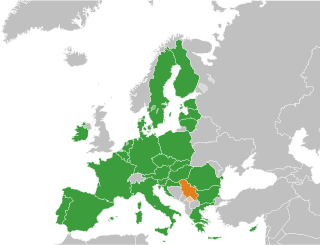
Bosnia and Herzegovina is a country in Southeast Europe, in the Balkans, bordering Serbia to the east, Montenegro to the southeast, and Croatia to the north and southwest. In the south it has a 20 kilometres long coast on the Adriatic Sea. Bosnia has a moderate continental climate with hot summers and cold, snowy winters. In the central and eastern regions, the geography is mountainous, in the northwest it is moderately hilly, and in the northeast it is predominantly flat. Herzegovina, the smaller, southern region, has a Mediterranean climate and is mostly mountainous. Sarajevo is the capital and the largest city.

Kosovo, officially the Republic of Kosovo is a country in Southeast Europe with partial diplomatic recognition. Kosovo lies landlocked in the centre of the Balkans, bordered by Serbia to the north and east, North Macedonia to the southeast, Albania to the southwest, and Montenegro to the west. Most of central Kosovo is dominated by the vast plains and fields of Metohija and the Kosovo field. The Accursed Mountains and Šar Mountains rise in the southwest and southeast, respectively. Its capital and largest city is Pristina.

Serbia and Montenegro, known until 2003 as the Federal Republic of Yugoslavia, FR Yugoslavia or simply Yugoslavia, was a country in Southeast Europe located in the Balkans that existed from 1992 to 2006, following the breakup of the Socialist Federal Republic of Yugoslavia. The country bordered Hungary to the north, Romania to the northeast, Bulgaria to the southeast, North Macedonia to the south, Croatia and Bosnia and Herzegovina to the west, and Albania to the southwest. The state was founded on 27 April 1992 as a federation comprising the Republic of Serbia and the Republic of Montenegro. In February 2003, it was transformed from a federal republic to a political union until Montenegro seceded from the union in June 2006, leading to the full independence of both Serbia and Montenegro.

Serbia, officially the Republic of Serbia, is a landlocked country in Southeast and Central Europe, situated at the crossroads of the Pannonian Basin and the Balkans. It shares land borders with Hungary to the north, Romania to the northeast, Bulgaria to the southeast, North Macedonia to the south, Croatia and Bosnia and Herzegovina to the west, and Montenegro to the southwest. Serbia claims a border with Albania through the disputed territory of Kosovo. Serbia has about 6.6 million inhabitants. Its capital Belgrade is also the largest city.

The Serbs are a South Slavic ethnic group native to Southeastern Europe who share a common Serbian ancestry, culture, history, and language. They primarily live in Serbia, Kosovo, Bosnia, Croatia, Montenegro as well as in North Macedonia, Slovenia, Germany and Austria. They also constitute a significant diaspora with several communities across Europe, the Americas and Oceania.

Serbian is the standardized variety of the Serbo-Croatian language mainly used by Serbs. It is the official and national language of Serbia, one of the three official languages of Bosnia and Herzegovina and co-official in Montenegro and Kosovo. It is a recognized minority language in Croatia, North Macedonia, Romania, Hungary, Slovakia, and the Czech Republic.

Republika Srpska ; also known as Republic of Srpska) is one of the two entities composing Bosnia and Herzegovina, the other being the Federation of Bosnia and Herzegovina. It is located in the north and east of the country. Its largest city and administrative centre is Banja Luka, lying on the Vrbas river, and with a population of about 138,963 people.

The Socialist Party of Serbia is a political party in Serbia. Ivica Dačić has led SPS as its president since 2006.

The Democratic Party is a social democratic political party in Serbia. Zoran Lutovac has led the party as its president since 2018.

The Yugoslav Wars were a series of separate but related ethnic conflicts, wars of independence, and insurgencies that took place in the SFR Yugoslavia from 1991 to 2001. The conflicts both led up to and resulted from the breakup of Yugoslavia, which began in mid-1991, into six independent countries matching the six entities known as republics that had previously constituted Yugoslavia: Slovenia, Croatia, Bosnia and Herzegovina, Montenegro, Serbia, and North Macedonia. Yugoslavia's constituent republics declared independence due to unresolved tensions between ethnic minorities in the new countries, which fuelled the wars. While most of the conflicts ended through peace accords that involved full international recognition of new states, they resulted in a massive number of deaths as well as severe economic damage to the region.

The Bosnian War was an international armed conflict that took place in Bosnia and Herzegovina between 1992 and 1995. The war is commonly seen as having started on 6 April 1992, following a number of earlier violent incidents. The war ended on 14 December 1995 when the Dayton accords were signed. The main belligerents were the forces of the Republic of Bosnia and Herzegovina, those of Republic of Herzeg-Bosnia and Republika Srpska, proto-states led and supplied by Croatia and Serbia, respectively.

Serbian diaspora refers to Serbian emigrant communities in the diaspora. The existence of a numerous diaspora of Serbian nationals is mainly a consequence of either economic or political reasons.

An administrative district of Serbia is the country's first-level administrative division. The term okrug means "circuit" and corresponds to Bezirk in German language. It can be translated as "county", though it is generally rendered by the Serbian government as "district". Prior to a 2006 decree, the administrative districts were named simply districts.

The Serbs of Bosnia and Herzegovina are one of the three constitutive nations of the country, predominantly residing in the political-territorial entity of Republika Srpska. They are frequently referred to as Bosnian Serbs in English, regardless of whether they are from Bosnia or Herzegovina.

The Kingdom of Serbia was a country located in the Balkans which was created when the ruler of the Principality of Serbia, Milan I, was proclaimed king in 1882. Since 1817, the Principality was ruled by the Obrenović dynasty. The Principality, under the suzerainty of the Ottoman Empire, de facto achieved full independence when the last Ottoman troops left Belgrade in 1867. The Congress of Berlin in 1878 recognized the formal independence of the Principality of Serbia, and in its composition Nišava, Pirot, Toplica and Vranje districts entered the South part of Serbia.

Bosilegrad is a town and municipality located in the Pčinja District of southern Serbia. The municipality comprises an area of 571 km2 (220 sq mi). According to 2011 census, town has a population of 2,624 inhabitants, while the municipality has 8,129 inhabitants.

The Croatian War of Independence was fought from 1991 to 1995 between Croat forces loyal to the Government of Croatia—which had declared independence from the Socialist Federal Republic of Yugoslavia (SFRY)—and the Serb-controlled Yugoslav People's Army (JNA) and local Serb forces, with the JNA ending its combat operations in Croatia by 1992. In Croatia, the war is primarily referred to as the "Homeland War" and also as the "Greater-Serbian Aggression". In Serbian sources, "War in Croatia" and (rarely) "War in Krajina" are used.

The accession of Serbia to the European Union (EU) has been on the current agenda for the future enlargement of the EU since 2012, when it became a candidate for accession. Serbia officially applied for European Union membership on 22 December 2009. Accession negotiations are currently ongoing. The latest report in October 2022 on Serbia's progress criticizes the country for a lack of reforms, issues with rule of law, issues with freedom of the press, as well as disalignment on geopolitical matters, though the country could still join the bloc by 2030.

Aleksandar Vučić is a Serbian politician serving as the president of Serbia since 2017. A member of the Serbian Progressive Party (SNS), he previously served as the president of the SNS from 2012 to 2023, first deputy prime minister from 2012 to 2014, and prime minister of Serbia from 2014 to 2017.

The Autonomous Province of Kosovo and Metohija, commonly known as Kosovo and abbreviated to Kosmet or KiM, is an autonomous province defined by the Constitution of Serbia that occupies the southernmost part of Serbia. The territory is the subject of an ongoing political and territorial dispute between Republic of Serbia and the partially recognised Republic of Kosovo, the latter of which has control over the territory. Its claimed administrative capital and largest city is Pristina.


















